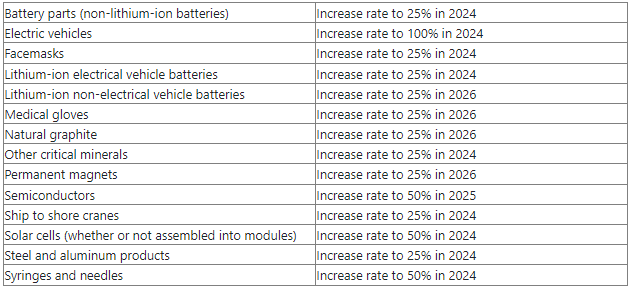
-advertisement-
The White House said the measures were designed to protect American workers and businesses in the face of China’s unfair trade practices, including “flooding global markets with artificially low-priced exports.”
China “firmly opposes” the new tariffs, the country’s Commerce Ministry said in a statement. “The increase in … tariffs by the United States contradicts President Joe Biden’s commitment to ‘not seek to suppress and contain China’s development’ and ‘not to seek to decouple and break links with China,’” it said. “This action will seriously impact the atmosphere of bilateral cooperation.”
EVs imported from China will see their tariffs more than quadrupled from 27.5% to 100% — a policy lever meant to challenge Beijing’s practice of encouraging aggressively low pricing by domestic EV manufacturers while levying a 40% tariff on US car imports.
In addition to EVs, increased tariffs will apply to imports of Chinese steel and aluminum, legacy semiconductors, battery components, critical minerals, solar cells, cranes and medical products. Tariffs on solar cells and semiconductors will double to 50%, while the remainder of the targeted imports will attract tariffs of 25%.

“China opposes the unilateral imposition of tariffs which violate (World Trade Organization) rules, and will take all necessary actions to protect its legitimate rights,” Chinese foreign ministry spokesperson Wang Wenbin told reporters Tuesday shortly before the widely anticipated White House announcement.
China’s global trade surplus in goods has soared in recent years and is now approaching $1 trillion, stoking tensions with the United States and Europe.
The Biden administration and European Union officials fear Beijing is trying to tackle a subsidy-fueled overcapacity problem in its decelerating economy by dumping excess products on global markets. Leaders from the Group of Seven developed economies will discuss how to protect their industries at a summit next month.
Editor:Vicky
▼▼▼
Intel nears $11 billion deal with Apollo for Ireland factory
Blacklisted China chipmaker SMIC becomes the world's second-largest pure-play foundry by revenue
South Korea is preparing a support package worth over $7 billion for the chip industry
Taiwan's TSMC April revenue surges to NT$236 billion, 2nd highest in history
Human trial of Elon Musk's Neuralink hits snag as brain chip begins to detac
Exclusive-US eyes curbs on China's access to AI software behind apps like ChatGPT
+86 191 9627 2716
+86 181 7379 0595
8:30 a.m. to 5:30 p.m., Monday to Friday
